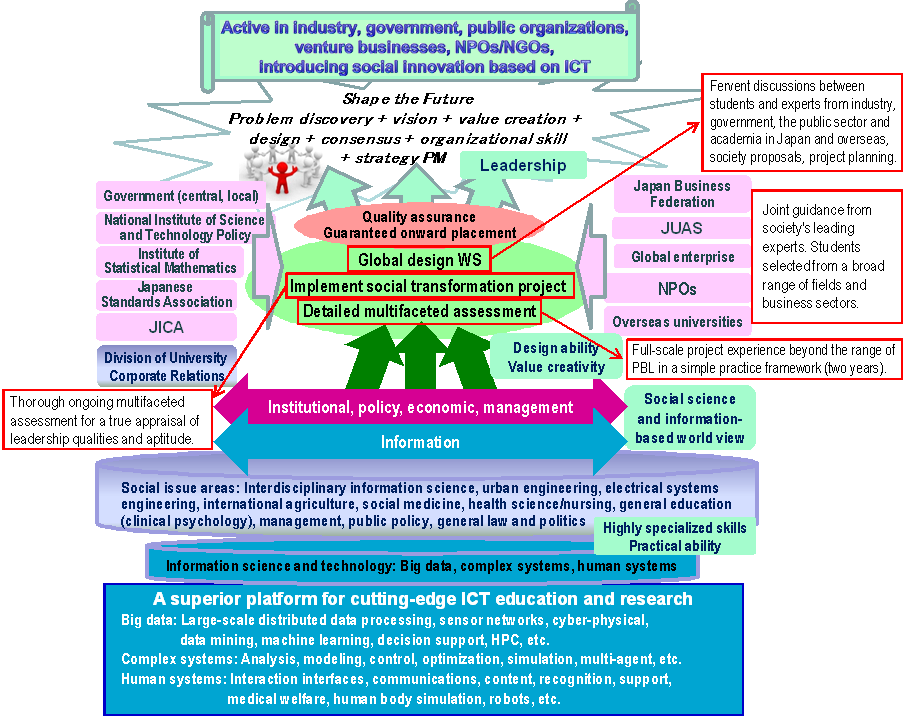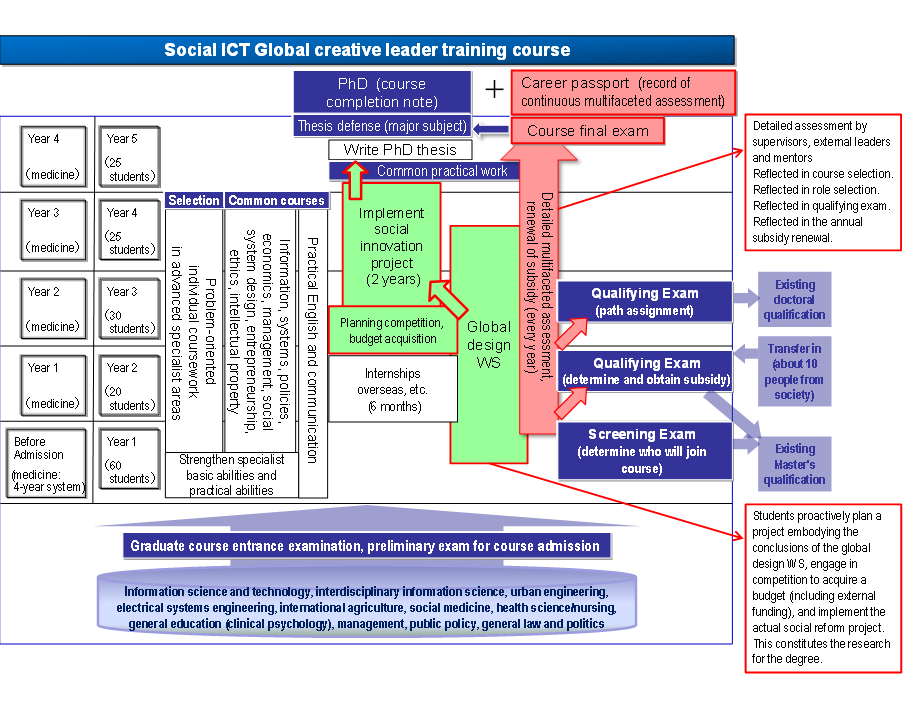ホーム > Application for Graduate program “social ITC Global Creative Leaders”
Application for Graduate program “social ITC Global Creative Leaders”
FY2013
“Graduate Program for Social ICT Global Creative Leaders (GCL)”
Recruitment of Mid-course Participation
1. Introduction of the GCL program
A series of new problems and possibilities are emerging as information and communication technologies (ICT) establish complex connections between people and objects in the real world, leading to the emergence of rapidly changing and untested socioeconomic systems. In these circumstances, there is a strong need for reforms to create and implement solutions that are valuable to people.
This program provides a continuous education curriculum from the Master’s course through the doctoral course, founded on the application of cutting-edge ICT to big data, complex systems and human systems. We cultivate top leaders and teams who can creatively design intelligent socioeconomic systems that solve pressing social issues and bring new value, and can show the way forward in social innovation, by integrating multiple specialist disciplines.

Figure 1. Conceptual illustration of the GCL program
2.Abstract of mid-course participation
This program basically provides a continuous education curriculum from the Master’s course through the doctoral course. In addition to this, we also accept mid-course participation students starting from the third year of the program (equivalent to the first year of the doctoral course. See Figure 2.).
Applicants for the mid-course participation at the third year are required the following skills and roles in the program. Having a concrete plan of the social innovation project that can start soon. Participating in the global design workshops in GCL program as an organizer, leading junior students, and having sufficient knowledge, experience and vision to accomplish this role. (Those who have already participated in the program as RA or TA are also welcomed.)
3.Eligibility for application
Students who aim to participate in the program must fulfill the condition below.
Ph.D. course students (starting from Apr. 2013) at one of the departments at the University of Tokyo listed below.
Grad. School of Information Science and Technology (Depts. of: Computer Science, Mathematical Informatics, Information Physics & Computing, Information & Communication Engineering, Mechano-Informatics, Creative Informatics)
Grad. School of Interdisciplinary Information Studies (Dept. of Interdisciplinary Information Studies)
Grad. School of Engineering (Depts. of: Urban Engineering, Electrical Engineering and Information Systems)
Grad. School of Medicine (Depts. of: Social Medicine, Health Science and Nursing)
Grad. School of Agricultural and Life Sciences (Dept. of Global Agricultural Sciences)
Grad. School of Education (Dept. of Integrated Education Sciences)
Grad. School of Economics (Dept. of Management)
Grad. School for Law and Politics (Dept. of General Law and Politics)
4.Notes
In principle, applicants are required to have learned or experienced the contents equivalent to those provided in the first and the second years of this program (for details, refer to the homepage of the GCL program). However, they can make up for such learning and experiences during the course if the learning and experiences are not enough at the beginning.
It is desirable that applicants are already participating in the program as RA or TA.
Students should execute the social innovation program with other members of the program, aspiring to be a leader to show the way forward in social innovation based on cutting-edge ICT, and having the permission of his/her supervisor.
Students should understand sufficiently the general concept and rules (e.g. requirements in the curriculum) of the program.
Students must agree that the completion of the program will be additionally stated in the certificate of Ph.D. degree.
5.Summary and quorum of each year (see Figure 2)
Although this document is targeted to the mid-course participation in the third year, for clarity, here we describe the contents of the whole course starting from the first year.
The first year (The first year of the Master’s course): Students will acquire and strengthen basic specialist knowledge and practical skills in the department to which they belong. Meanwhile, they also acquire basic knowledge and viewpoints of social innovation and social ICT, and cultivate problem consciousness, through the original class subjects provided by this program. In addition, they master basic skills to be a global leader, and experience debate and cooperation with top-level persons from society (including those from overseas), through practical English classes, communication skills training courses, and global design workshops.
The number of students for the first year is 60 (in the plan), who will be chosen from applicants through a selection. In the latter half of the first year, each course student decides whether to continue this course to pursue a Ph.D. degree, or to move on to the normal curriculum to finish the Master’s course (and possibly go on to the doctoral course). 20 students are selected from those who hope to go on to the second year of the course. Other students will pursue department curriculum, deepening their specialties with the above mentioned basic skills, and are expected to play an active role in society.
The second year (The second year of Master’s course): Students pursue a Ph.D. degree as a global creative leader through the original curriculum of this course. In addition to the course original subjects and ones from each student’s department, all students are required to undertake an approximately 6-months internship both in abroad and in Japan (With a financial support. Might be in the third year depending on the situation.), design a social innovation project, and conduct research practices related to social ICT, and will attain Master’s degree of the departments they belong to. On the condition that they go on to the doctoral course, all students are subsidized (except for those who decline). The number of students for the second year is 20 (in the plan).

Figure 2. Course flow of the GCL program
The third year (The first year of doctoral course): In addition to the above mentioned class subjects, students implement the social innovation project designed by themselves. The number of students is 30 (in the plan). This includes the students promoted from the second year, and also those selected through the exam (about 10) which is mainly targeted to working people. On the third year and after (until the end of the fifth year), all students are subsidized (except for those who decline).
The fourth year: Continue taking class subjects and social innovation project.
The fifth year: Summarize achievements of the above project in doctoral dissertation. When a student has passed the thesis defense, the policy of which reflects the spirit of this program, it will be stated in the diploma that this student has completed this course. In addition, a certification of completion of the course will be given. Students who have finished the program are expected to lead social innovation as an advanced global creative leader at various places such as companies, government, industrial organizations, and startups.
6.Selection and employment period
Selection of course students is based on the prescribed application format and oral interview.
Number of positions: 10 (approx.)
Documents to be submitted:
Application form and its specified accompanying sheets, clipped-on.
For Mid-course Participation Students (2013 enrolled): GCLApplication201308
Letters of recommendations from two individuals. (Written by others. Free format. Must be sealed up. Comments on the applicant’s competence as a GCL course student should be included. Examples of recommenders: supposed advising professor, supervisors at interns and companies, but not limited to them. )
Qualification of English skill (e.g., TOEFL and TOEIC scores)
(For questions about the above documents, contact the GCL program office listed in the last.)
The period for submission: Aug. 5, 2013 (Mon), 10:00 ~ Aug. 9, 2013 (Fri), 17:00. Submission deadline is validated according to the postmark date if it is sent by postal mail.
Place to be submitted:GCL program office (The postal address is shown in the last part of this document.)
Oral interview:
Date and place will be notified at the web site of GCL (listed in the last.) by August 1.
(0) If you like to hand out some materials, prepare 20 copies and hand out them to interviewers before the presentation.
(1) Presentation:Give a presentation about your educational and working experiences (3 min.), and the plan of your project (10 min.). PC for presentation should be prepared by yourself.
(2) Question and answer:Your will undertake a question-and-answer period (about 15 min.) based on the submitted applications and the presentation.
Period of employment:Oct. 1, 2013 ~ Mar. 31, 2016
The result of the selection will be notified personally by the end of September, 2013.
The formats and the newest information are given in the program homepage (URL is given at the end of this document).
7.Characteristics of the course and requirements for program completion
(See also the GCL program homepage : http://www.gcl.i.u-tokyo.ac.jp)
Program appointees
We have 89 program appointees with diverse backgrounds (from industry, government, the public sector and academia). Through various lectures and workshops, course students can be mentored by these experts in addition to their advising professors. (For details, see the GCL program homepage.).
Detailed multifaceted assessment
Course students are assessed by means of the detailed multifaceted assessment performed by advising professors, external professors, and mentors, and the Qualifying Examination.
Issue of subsidies
Course students on and after the second year will be subsidized (the amount of subsidy is renewed every year). However, note that it is not allowed to simultaneously receive other subsidies (including the ones listed below). To receive subsidies from other grants, you can decline the one from the GCL program.
Research Fellow (DC) of the Japan Society for the Promotion of Science, Japan Student Services Organization (JASSO) scholarship, Japanese Government (Ministry of Education, Culture, Sports, Science and Technology) Scholarship, JASSO Scholarship for Privately Financed International Students, Scholarship from home country (for international students), Ph.D. research aid from the University of Tokyo.
(For details, see the GCL program homepage.).
Requirements for course completion
To complete the course, students are required to accomplish following.
・Taking the lectures “Global Creative Leader Special Practical English SkillⅠ・Ⅱ”
・Organizing and participating in global design workshops
・Executing the social innovation project
Mid-course participants are required to have already learned and experienced the knowledge and skills equivalent to those provided in the first and the second years of the program, or to make up for them after joining the course. For details, refer to the home page of the GCL program.
8.Contact information for the program
GCL program office:
Room #621, Eng. Bldg. 8, the University of Tokyo, 7-3-1, Hongo, Bunkyo-ku, Tokyo, JAPAN 113-8656
Tel:03-5841-8746
E-mail: gcl_admin@gcl.i.u-tokyo.ac.jp
GCL program homepage:
http://www.gcl.i.u-tokyo.ac.jp

